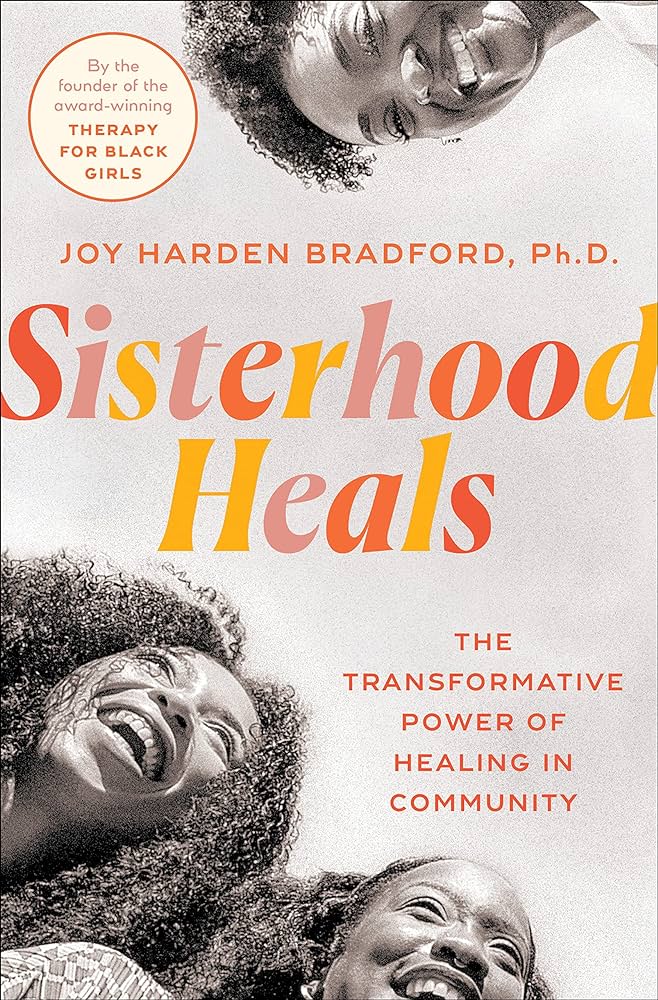
Saying nothing doesn’t work: How to help a grieving friend
Dr. Joy Harden Bradford is a licensed clinical psychologist who founded the award-winning podcast Therapy for Black Girls and is considered the go-to therapist for Black women looking to prioritize their mental health.
In her book, Sisterhood Heals: The Transformative Power of Healing in Community, Dr. Joy shows you how to deepen your friendships and become the best possible version of yourself in the process. She shares all she’s learned using the tenets of psychology and group therapy to help us foster relationships that are not only positive, but transformative.
An excerpt of Sisterhood Heals (pages 139–143) “Attending to a friend’s grief”
If our circle exists for long enough, there will undoubtedly be a time when the group is focused on supporting someone through the loss of a loved one. When that happens, it can be hard to know what to do or say, and the mistake we often make is not saying or doing anything. We worry that asking about the deceased loved one will only make the memories more painful and instead choose to avoid these conversations. Oftentimes there is nothing further from the truth. Asking a friend to share memories and stories about their loved one can be comforting and sends the message that you understand how important this person was to them and that you are holding space for them to remember.
Sisterhood Heals (Ballantine) by Joy Harden Bradford
Understanding that we all grieve differently is key. Some people isolate and want solitude while others throw themselves into a project. This is especially important when discussing Black women because we’ve not historically been given space to be sad and grieve, so your sister might find herself doing the thing that comes naturally—throwing herself into work or a new project. And while some level of distraction may help to manage the intensity of grief, it might also prevent her from tending to herself in the way that is needed following a loss. I invite us as friends of someone grieving not to be fooled by this performance of okayness and to be gentle but intentional about helping our Sis make space for her grief. In addition to that intentionality, here are a few other things to consider:
- She may not know what she needs.
Many times, our go-to when someone is grieving is to say “let me know what you need.” But the truth is that grieving people often don’t know what they need. As much as possible, the circle should try to anticipate some of her needs. Prep or deliver meals to make sure she has food. Go over to the house and wash dishes or a load of clothes. Offer to help her make arrangements, if necessary. Be there to let her cry or offer to sleep over so that she’s not alone at night if she lives by herself. - Attend the services.
Funerals and other memorials can be very uncomfortable to attend, but if at all possible, try to be there. Friends often see this as a very concrete way of your being there during a time when they needed it most. If you can’t be in attendance, see if it’s possible to send a flower arrangement or offer to help with the repast if one is scheduled. - Don’t assume she’s not still grieving in six weeks or six months.
Many bereaved people have commented that they find the months after a funeral or memorial service the most difficult because they often feel forgotten. Many of the house visits and meal offers have stopped and they are alone with their thoughts. Be intentional about showing up after all the activity has come to a stop. Put reminders on your calendar to check in and make a note to remember the death anniversary as this will likely be a difficult time of the year for her. It would be great for the circle to offer a little extra care and support as the anniversary gets closer.
In sickness and in health
Similar to the experience of losing a loved one, a sister in the circle experiencing an illness can be equally destabilizing. This can be complicated because Black women tend to keep health concerns to themselves for fear of worrying or being a burden to others. But for those circles where this information is shared, there are some tangible ways to show support for this sister.
- Offer to go to doctor’s visits with her.
Sometimes when people are experiencing a health crisis it can be difficult to fully comprehend what healthcare professionals are sharing. If this is the case, offer to attend to help take notes for her to review later and to ask any questions that may seem important. If this isn’t the case, you can still offer to be there, even if only in the waiting room, for moral support. - Don’t pretend like there’s nothing happening.
You may be feeling like you’re making her health too much of a focus by asking questions and checking in with her, but the alternative is to make her feel like you don’t care and that this is too big for the circle to hold. Trust that she will set limits with you if she’d like the focus to be elsewhere as opposed to assuming otherwise. - Help her find additional support.
The process of finding a specialized therapist or other healthcare professional can be daunting. Try to help with the search by doing some research for professionals who meet her criteria and offer a shorter list that she can then choose from. - Find out if there’s a way the group can support her health.
Does she need to cut back on sugar to improve her outcomes? Perhaps more physical activity is needed? Consider ways the group can support this by taking a class in low-sugar cooking together or going on evening walks.
When a friend is depressed or struggling with their mental health
We often hear the refrain to “check in on your strong friends” after a high-profile person dies by suicide or reveals they are struggling with their mental health. While these calls for action are often well intentioned, it is not always clear what one is to do as part of this “check in.” When we know this sister we love is struggling, our initial response is often the same one we use for other types of grief: “Let me know if there’s anything I can do to help.” While perhaps thoughtful, those sentiments typically do not go far enough for someone who is depressed or struggling in a similar way.
One of the hallmark symptoms of a depressive disorder is a difficulty with concentration and other executive functioning. This means they may not be able to organize their thoughts well enough to let you know what they need. If possible, try to anticipate what they may need. Offer to do very practical things that might make a big difference, like going over to wash dishes or do a load of laundry. People who are depressed often have a loss of appetite or no motivation to feed themselves, so consider bringing over their favorite food or some protein shakes/smoothies in case it’s easier for them to get something down by drinking rather than chewing. Something else that can be helpful and comforting for people struggling with mental health challenges is for you to just be present while they do something they may want or need to do, but can’t find the motivation to start. Simply standing in a doorway, talking to them from the hallway, may give them the extra push they need to take a shower or wash their hair.
Similarly, they may not want you to talk. Perhaps just being there to sit with them while they take a nap would be comforting. Supporting someone struggling with their mental health can look lots of different ways and oftentimes tailoring your attempts to help comes down to what you know about your sisters and how they tend to be impacted when they’re struggling. I recently saw a post shared via Today that beautifully captured what it can look like to show up for someone we love when they’re having a hard time. After Ashlee experienced a miscarriage, her friend Anna sent the following text as a way of checking in on her.
Checking on you. Please choose from the following:
- I pick your kids up any time after 3:30 today & show them a good time through dinner (which would be at Chick-fil-A, obvi, & would include takeout brought back for you).
- I send DoorDash dinner of your choice to you. (This offer is valid any day this week. Also next week.)
- I have to go to Target today, I can pick up anything you need & drop it on your doorstep & not talk to you at all.
- I can send prayers & good vibes & you can politely decline any tangible services at this time.
This is wonderful! Offering options that involve both tangible and intangible things, silence or presence, is a great model to adopt when we consider how we might offer support to a sister who may be struggling with her mental health, and one that would likely be appreciated and helpful.
Longevity within a sister circle is often a blessing, and it also means that you’ve likely experienced some significant life stuff together. Research indicates that having a strong support system is a significant factor in being able to rebound following a life stressor. To ensure that our systems stay intact, it is important to know how to effectively navigate conflicts that may arise and how to support one another through difficult experiences.
This is an excerpt from Sisterhood Heals by Joy Harden Bradford, PhD. Copyright © 2023 by Joy Harden Bradford, PhD. All rights reserved. No part of this excerpt may be reproduced or reprinted without permission in writing from the publisher.
Connect with Dr. Joy Harden Bradford
Therapy for Black Girls on Instagram
Therapy for Black Girls on Twitter
Learn more about Therapy for Black Girls University




